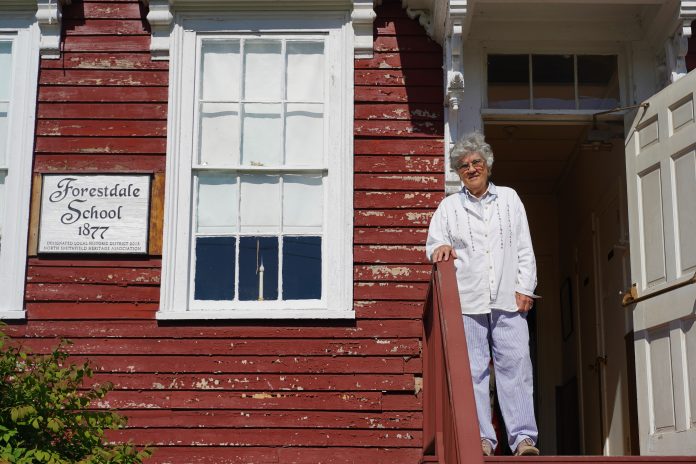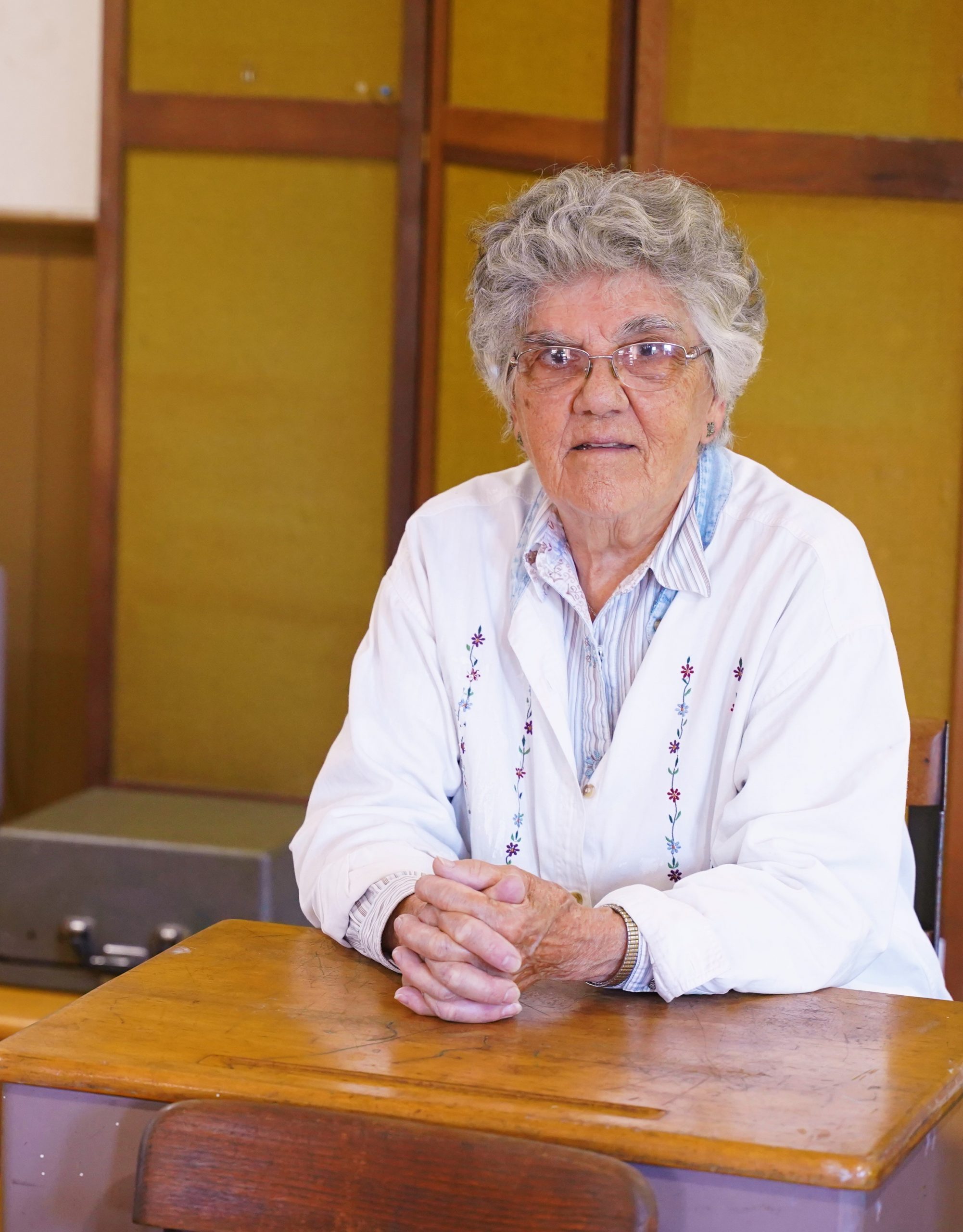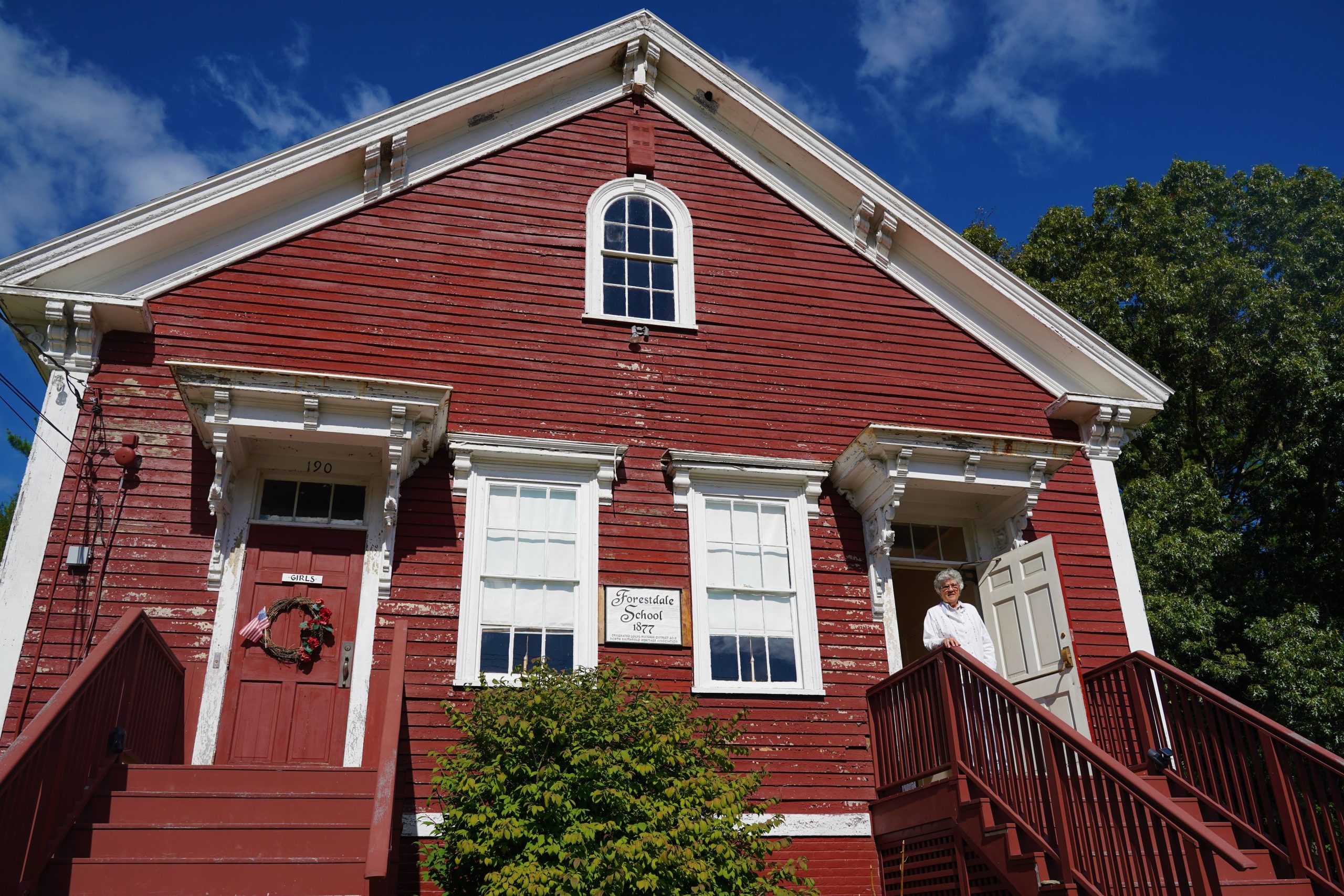NORTH SMITHFIELD – In the one-room schoolhouses of the nineteenth century, the Monitorial System of education, also known as the “Lancasterian” system after co-founder Joseph Lancaster, was the effective method of mutual instruction.
The teacher gave a lesson; older students tutored the younger; the young students learned, and the older students strengthened their own skill and knowledge of the subject taught.
Louise Vanhouwe, 90, of North Smithfield, remembers when students in grades one to four at the one-room Forestdale Schoolhouse helped each other.
Vanhouwe was a student attending the Forestdale Schoolhouse from 1935 to 1939. One teacher was assigned to teach 45-50 students, and the students worked together well under the Lancasterian system, remembers Vanhouwe.
Before contemporary times, “no child left behind,” also meant the youngest children of a household came to school. Students or the teacher would, “throw a blanket and pillow on the floor,” and the babies and toddlers would nap, says Vanhouwe.
The first grade desks were constructed so the back part served as the desk for the student sitting behind you, says Vanhouwe. Sometimes, she says, “we fell asleep at our desks.”
It wasn’t surprising as many children did farm chores.
The teachers were female, but women weren’t “entitled” to teach if they got married, says Vanhouwe.
Women could do everything a man could do – and “give birth”, she says and smiles. She credits a school official, Miss Mary Foley – later Mrs Potenza – with changing such “foolish” rules.
Vanhouwe, loyal to her roots, speaks with strong affection for the Forestdale school. She is the caretaker of the building that serves as the North Smithfield Heritage Association headquarters and is a museum. The school closed in 1974.
The school dates to 1877, a few years after North Smithfield was incorporated as a town. In those days the population was around 3,000. Industrialism was expanding and the town had two cotton mills. The land belonged to the Forestdale Mill, Vanhouwe notes.
Through influence of educationalists such as Horace Mann and Frederick Taylor, the Lancasterian system was usurped and replaced by the current public school age-segregated system of education, where students of the same age group attend classes together. Other traditional aspects of education in America have changed that were once significant in North Smithfield schools, such as celebrating patriotism.
One-hundred and twenty-two years ago G. A. Smith, superintendent of North Smithfield schools, wrote about the schoolhouse in the manufacturing village of Forestdale, “Flag Day was observed by the school at Forestdale in a very pleasant and satisfactory manner.”
What’s more, wrote Smith, “I hope to gather all of the schools of our town at some central point, perhaps at Slatersville, on the coming birthday of Washington. I am fully satisfied that an occasional mingling of the school children, especially on such memorable days, is highly and purely educational.”
Smith’s statement was published in the Annual Report of the Board of Control of the State Home and School for 1898.
The school still looks much the same, and has separate entrances for boys and for girls At recess, students played on opposite sides of the school property. The boys, “would peek,” at the girls, says Vanhouwe laughing with the remembrance of childhood innocence. The girls would, “sneak around,” to socialize with the boys, she adds.
“We were happy to play outside,” Vanhouwe said. “We made up little ditties.”
But in those days the school lacked amenities taken for granted today. The Forestdale school, for example, had an outhouse. At lunch time, “I used to sneak home,” Vanhouwe said.
For drinking water at the school, children had to bring their own cup and hand pump water from the well.
Her mother had taught young Louise to read. Today she said she enjoys reading, “everything and anything.”
Vanhouwe says people had more freedom in the past, with less restrictions. Back then when her mother was at work, and young Louise was in 2nd or 3rd grade, she had a key to get in the house. She and her friends were allowed to play outdoors, but not in the house.
Her mother was out helping Mrs. Place with chores.
Mrs. Place taught little Louise the intricate art of rug hooking. Louise would hold a small frame in her lap with a picture in pencil and, “go in hook every tiny hole in very fine burlap,” she says.
She learned to knit sweaters, and scarves, and a reversible afghan. Her father would bring home material from Andrews Mill where he worked.
Her father knew Susan B. Anthony.
“They were kids together,” Vanhouwe notes, before Anthony became the famous women’s voting and rights advocate. In adulthood, her father was stationed at Fort Devons and was getting ready to be shipped to France during the world war when the yellow virus struck, killing some soldiers in their beds.
Vanhouwe notes her youth in Forestdale life was bucolic.
“There were still horse and carriages; you could count the cars in town,” she says.
She helped with farm chores, such as gathering eggs from the family’s 100 chickens. She remembers gardening practices, such as leaving carrots in the ground with a stake to mark them and covering the carrots with newspapers, old rugs and shirts, for when the snow came.
Neighbors likewise planted gardens, and they helped each other.
“We all shared what we did,” she said.
Vanhouwe attended public middle school and high school in Woonsocket.
She recalls questioning the mathematics teacher, who responded that she was not paying attention and would never go to college. Some of the big city Woonsocket kids found her questioning amusing and laughed.
Vanhouwe said she turned to a school official Miss O’Neil – a “very understanding” person who took her under her wing. For Vanhouwe had a definite career in mind: telephone operator.
She graduated from Woonsocket High School in 1947.
Ordinarily, visitors had to be buzzed into the telephone building on Ascension Street on a hill in Woonsocket. At that building, the men worked on the ground floor, the ladies, some 250 operators, on an upper level.
The day Vanhouwe went to seek employment, the door was left open and she walked in without buzzing, and was surprised to see a few women she knew. She also saw a few relatives that were telephone operators, and was hoping to pursue the same career.
Apparently impressed by her take charge attitude and other attributes, the phone company hired Vanhouwe and she trained for three weeks to become an operator.
“I just loved it,” she said.
In 1955, she had an opportunity to transfer to Newport, but the long ride would have presented a problem; she wouldn’t have gotten home by taxi until 2 a.m. Instead, Vanhouwe retired.
She remembers meeting her husband Rene’ Vanhouwe for the first time when they were just kids.
The story “is crazy, very crazy,” she said smiling.
Vanhouwe – at the time Louis Beaudin – was in seventh grade, and a boy was giving Rene’ a hard time for speaking with an accent. Rene’s father was Belgian and, “talked Flemish.”
Vanhouwe kicked the harassing boy hard in the knees and “told him off.”
That was not Rene’s way.
“I was a little spitfire,” she said.
She did not see Rene’ for some time.
Vanhouwe remembers double-dating another boy with her brother and his girlfriend. They would go places by bus, trolley, or walk.
“We had no cars,” she said, adding that swimming at Slatersville pond was a favorite date.
She met up with Rene’ once again and he invited her to a movie. She had to ask her mother for permission.
Rene’ had a 1942 Chevy – a little coupe with a back trunk and no rumble seat. He was older and more experienced, having been a military man. She remembers an outfit she wore on a date: a skirt, top, and a chic, “thin and warm,” white jacket of 80 percent cotton and 20 percent wool.
She worked at United Public Market, a grocery store in Woonsocket, until 9 p.m. and then sometimes went dancing with Rene’ at the swanky Rhodes on the Pawtuxet ballroom.
Louise and Rene’ married in 1949. They had three children. Their daughter has passed on. One of their sons lives out of state, and third child, also a son, resides in Rhode Island. Rene’ passed away in 1986.
This year has been one for the history books, Vanhouwe said, noting that that election years are problematic.
One massive change this year is in education, as parents scramble to make the appropriate choices for their children.
The choices include allowing their children back into school buildings, virtual learning, or something different and out of Forestdale’s past: educating a small group of children of various ages together.
Private home “pods” unite the educational method of Vanhouwe’s day with the present for a new tomorrow.
Meanwhile, Vanhouwe lives in the moment contributing her stories, wit and wisdom, and sense of fun and creativity – and doing chores at the Forestdale school where her life began.









